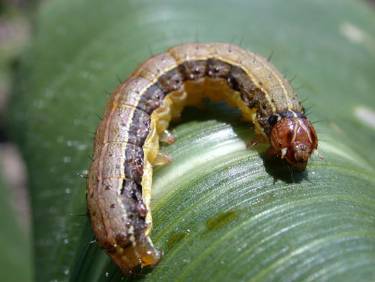Fall Army Worms
Nashville, Ark. – Fall Army Worms are upon us. Chances are army worm larvae and eggs are already in your pastures. It is important to scout your pastures for any damage or evidence of army worm activity. If treatment is done early, it can be very effective, if not; army worms can take over whole pastures and compete with livestock for forage.
Some major characteristics of fall army worms include: The egg is creamy white and dome shaped, with a flat base. The nuisance that we are concerned with is the caterpillar, the larva stage. When newly hatched, the larva is light green with a dark head capsule and measures approximately 1/16 inch long. As the larva feeds, it becomes darker and longer with light colored lines down the sides of its body. The head is unique in that it has a light yellow inverted “Y” on the top. As it matures, it also contains 4 black dots on the end of its abdomen. Fully grown larva, are about 1½ inches long.
Recognizable damage: pasture patches typically appear browned or burned out resembling drought damage. The damaged patch will increase in size over time, as fall army worms chew more tender growth. Fall army worms typically target newly established stands of bermudagrass, winter annuals, fescue, or orchardgrass.
In Arkansas, army worms typically appear when plants green-up from a rain that has ended a prolonged dry/drought period. This happens as early as July and continues into fall. The rain showers we experienced the past few weeks are perfect for forages to begin attracting army worms.
Treatment: When to treat: chemical control is suggested when 3 or more worms per square foot are found; also when the worms reach about ½ inches in size. However, early treatment before this is not necessarily discouraged. However, treatment after worms reach 1½ inches in size is discouraged, because the worms are ready to molt and most of the damage is already done. What chemicals to use: depends on individual operations. Cost, availability, restricted use, chemical type, grazing and hay harvest restrictions are all factors that should be considered when determining a product to use.
All of the above information has been obtained from UAEX research and Extension Fact Sheets. For more information or to obtain any of these articles, please come by or contact the Howard County Extension Office at 870-845-7517.
The MP144 Insecticide Recommendations contains a complete list of chemicals, application instructions, and grazing/hay restrictions for the products that the Cooperative Extension Service suggests to use for fall army worm control.
By Kaycee Davis
County Extension Agent - Agriculture
The Cooperative Extension Service
U of A System Division of Agriculture
Media Contact: Kaycee Davis
County Extension Agent - Agriculture
U of A Division of Agriculture
Cooperative Extension Service
421 N. Main Nashville AR 71852
(870) 845-7517
kmdavis@uada.edu
Related Links
The Arkansas Cooperative Extension Service is an equal opportunity institution. If
you require a reasonable accommodation to participate or need materials in another
format, please contact your County Extension office (or other appropriate office)
as soon as possible. Dial 711 for Arkansas Relay.
Pursuant to 7 CFR § 15.3, the University of Arkansas System Division of Agriculture
offers all its Extension and Research programs and services (including employment)
without regard to race, color, sex, national origin, religion, age, disability, marital
or veteran status, genetic information, sexual preference, pregnancy or any other
legally protected status, and is an equal opportunity institution.
